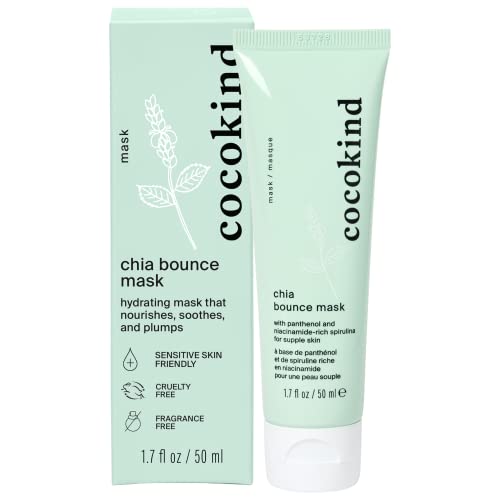
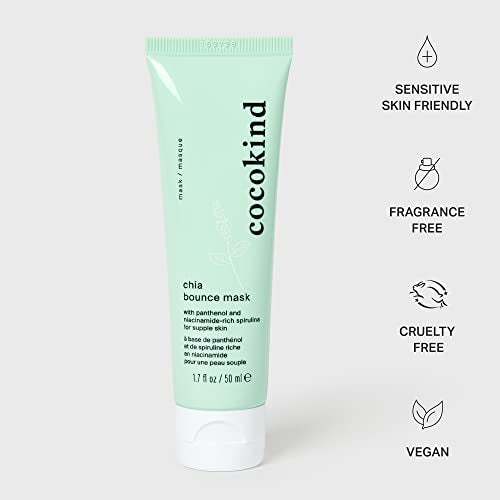
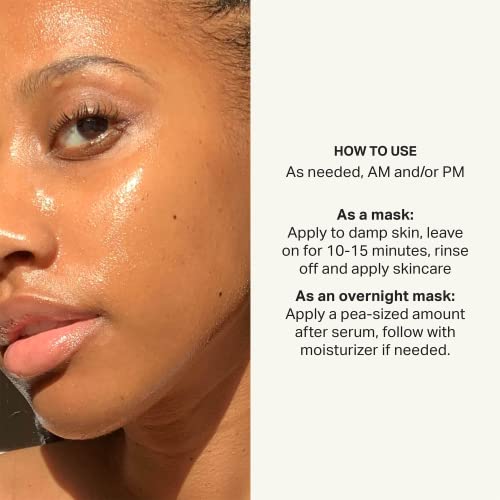
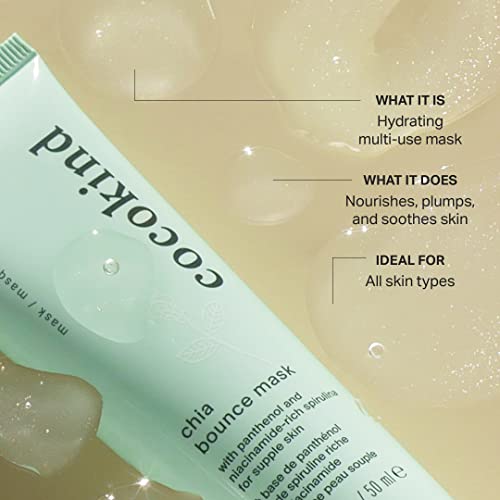
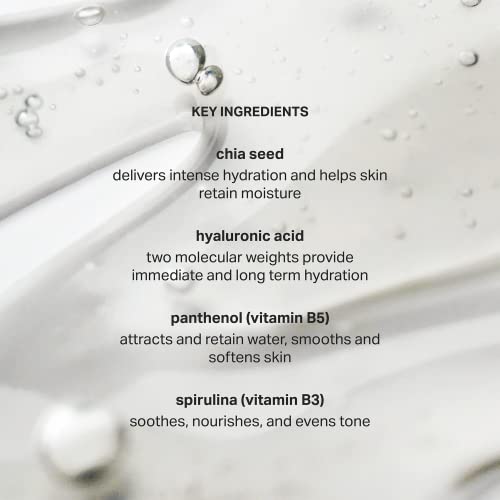
Cocokind Chia Bounce Mask - Hydrating Gel for Even Skin Tone, Cruelty-Free - 2.5oz


Potassium Sorbate
Medium RiskPotassium sorbate is a potassium salt of sorbic acid, primarily used as a preservative in food and cosmetic products. It inhibits the growth of molds, yeast, and some bacteria, extending the shelf life of products. It is commonly found in various formulations due to its effectiveness and low toxicity.
Sustai Insights
Potassium sorbate serves as an effective preservative, preventing microbial growth in food and cosmetic products, which is vital for safety and longevity. Although it has a low risk of carcinogenicity and developmental toxicity, there is a moderate concern regarding allergies and immunotoxicity. Environmentally, it poses minimal risks as it is not significantly bioaccumulative. Regulatory agencies have verified its use, although some products may face restrictions. Overall, it is assessed as a medium risk ingredient, with safe usage practices recommended, and alternatives such as natural preservatives could be considered.
Salvia Hispanica Seed Extract
Medium RiskSalvia hispanica seed extract is derived from the seeds of the Salvia hispanica plant, commonly known as chia. It is primarily used in cosmetic formulations for its hydrating and soothing properties, often included for its high content of omega-3 fatty acids and antioxidants.
Sustai Insights
Salvia hispanica seed extract offers functional benefits such as moisturizing and antioxidant properties, contributing to skin hydration. It is sustainably sourced and considered biodegradable. However, it presents a moderate risk of allergies and immunotoxicity, with low concerns for carcinogenicity and reproductive toxicity. Regulatory authorities do not currently impose significant restrictions on its use. Overall, the risk level associated with this ingredient is medium, emphasizing the need for careful formulation and usage practices, particularly in products designed for sensitive skin.
Spirulina Maxima (Algae) Extract
Medium RiskSpirulina maxima extract is an extract of the blue-green algae Spirulina maxima, commonly used in dietary supplements and cosmetics for its nutritional properties and potential skin benefits. It is rich in proteins, vitamins, and antioxidants, contributing to its functional applications in various formulations.
Sustai Insights
Spirulina maxima extract offers functional benefits, including nutritional support and antioxidant properties, making it popular in health products. It is recognized for being sustainably sourced and biodegradable. Health risks are minimal, with low concerns for carcinogenicity, allergies, and reproductive toxicity; however, contamination concerns persist. Regulatory bodies do not impose significant restrictions, indicating moderate risk overall. Safe usage practices are recommended, and alternatives include other algae extracts or plant-based ingredients.
Leuconostoc/Radish Root Ferment Filtrate
Low RiskLeuconostoc/radish root ferment filtrate is a natural fermentation product derived from radish roots, commonly used in skincare for its potential preservative properties and skin-conditioning benefits. It functions by harnessing the metabolic activity of Leuconostoc bacteria to provide a source of beneficial compounds.
Sustai Insights
This ingredient offers functional benefits, primarily as a preservative and skin-conditioning agent, while being biodegradable and sustainably sourced. Health risks are generally low, with no significant concerns regarding carcinogenicity or allergies, though contamination concerns exist. Environmentally, it poses minimal risks, categorized as low overall risk based on current scientific consensus. Safe usage practices are advised, and alternatives may include other natural preservatives like tocopherol or rosemary extract.
Sodium Acetylhyaluronate
Low RiskSodium acetylhyaluronate is a sodium salt derivative of hyaluronic acid, commonly used in cosmetic formulations for its hydrating properties. It functions primarily as a humectant, attracting moisture to the skin and helping to maintain hydration levels in various personal care products.
Sustai Insights
Sodium acetylhyaluronate is recognized for its effective moisture-retaining properties, enhancing skin hydration and improving product texture. It has low health risks, with negligible concerns regarding carcinogenicity, allergies, or reproductive toxicity. Environmentally, it poses minimal risks and is not associated with significant pollution or bioaccumulation. Regulatory assessments indicate no current restrictions. Overall, it is considered low risk, making it a favorable ingredient in cosmetic formulations.
Fructooligosaccharides
Low RiskFructooligosaccharides are short-chain carbohydrates composed of fructose units. They are commonly used as prebiotics, promoting beneficial gut bacteria and enhancing digestive health. These ingredients are often found in food products and dietary supplements, where they serve to improve flavor and texture while supporting overall gut health.
Sustai Insights
Fructooligosaccharides offer functional benefits as prebiotics, fostering the growth of beneficial gut bacteria. They are generally regarded as safe with low concerns for cancer, allergies, and reproductive toxicity. Environmentally, they are biodegradable and pose minimal ecological risks. Regulatory bodies have not issued warnings, affirming their low-risk status overall. Safe usage involves moderation, and potential alternatives include inulin or other fiber sources. Overall, fructooligosaccharides are assessed as low risk.
Arginine
Low RiskArginine is a naturally occurring amino acid that plays a critical role in various biological processes, including protein synthesis and the production of nitric oxide, which is important for vasodilation. It is commonly used in dietary supplements and functional foods.
Sustai Insights
Arginine offers functional benefits such as promoting blood flow and supporting muscle metabolism. It is not associated with significant health risks, as concerns regarding carcinogenicity, allergies, and reproductive toxicity are low. Environmentally, it presents minimal risks, being biodegradable and not classified as a pollutant. Regulatory bodies have not imposed specific restrictions on arginine. Overall, the risk level is low, indicating that arginine can be safely used in products, though safe usage practices should be followed.
Chondrus Crispus (Carrageenan)
Low RiskChondrus crispus, commonly known as carrageenan, is a gelatinous polysaccharide derived from red algae. It is primarily used as a thickening, stabilizing, and gelling agent in food, cosmetics, and pharmaceuticals, providing texture and consistency to various products.
Sustai Insights
Carrageenan offers functional benefits such as effective thickening and stabilizing properties, making it valuable in food and cosmetic formulations. It is considered to have low health risk concerns regarding carcinogenicity, allergies, and reproductive toxicity, though moderate concerns exist for non-reproductive organ toxicity. Environmental impacts are minimal, as it is not known to be bioaccumulative or a significant pollutant. Regulatory bodies have not issued specific restrictions against its use, affirming a low overall risk assessment for this ingredient. Alternatives like agar-agar or pectin may be considered for those seeking substitutes.
Lactobacillus Ferment
Low RiskLactobacillus ferment is an extract of the probiotic bacterium Lactobacillus, commonly used in cosmetic and personal care products for its potential skin health benefits. It is known for its role in fermentation processes, contributing to the formulation's efficacy as a skin conditioning agent.
Sustai Insights
Lactobacillus ferment offers functional benefits by improving skin hydration and barrier function, and it is often derived from sustainable sources. Health risks are low, with minimal concerns regarding carcinogenicity, allergies, or reproductive toxicity. Environmentally, it poses low risks, with no significant pollutant or bioaccumulation potential. Regulatory agencies do not impose restrictions on its use. Overall, the ingredient is assessed as low risk, and safe usage practices should be followed. Alternatives such as other probiotic extracts may be considered for similar benefits.
Linolenic Acid
Low RiskLinolenic acid is an unsaturated fatty acid commonly found in various plant oils. It plays a vital role as an essential fatty acid, which means it must be obtained through diet. This ingredient is used in products for its emollient properties and contribution to skin health.
Sustai Insights
Linolenic acid offers functional benefits, particularly as a moisturizer and skin-conditioning agent, and is derived from sustainable sources. Health risks are minimal, with low concerns regarding carcinogenicity, allergies, and reproductive toxicity. Environmental risks are also low, with no significant pollutant potential. Regulatory bodies have not imposed significant restrictions on its use. Overall, it presents a low risk, making it a favorable choice in formulations, although alternatives such as other plant-based oils may also be considered.
Diglycerin
Low RiskDiglycerin is a dimer of glycerin, consisting of two glycerin molecules linked together. It is commonly used in various personal care and cosmetic products for its moisturizing properties and ability to enhance product texture and stability.
Sustai Insights
Diglycerin serves as an effective humectant, improving moisture retention in formulations, which can be beneficial for skin hydration. It is generally recognized as safe with low concerns regarding carcinogenicity, allergies, and reproductive toxicity. While there are minimal environmental risks associated with its use, it is not classified as a pollutant or bioaccumulative. Regulatory bodies do not impose significant restrictions on diglycerin, indicating a low overall risk profile. For safe usage, it is advisable to follow recommended concentrations in formulations. Alternatives such as glycerin or plant-based humectants may be considered for those seeking different sourcing options.
Coconut Fatty Acid
Low RiskCoconut fatty acid is a mixture of fatty acids derived from coconut oil, primarily composed of caprylic and capric acids. It is commonly used in cosmetic formulations for its emollient properties, helping to moisturize and soften the skin.
Sustai Insights
Coconut fatty acid serves as an effective emollient, enhancing skin hydration and texture. It is considered to have low health risks, with minimal concerns regarding carcinogenicity, allergenic potential, and reproductive toxicity. Environmentally, it is not recognized as a pollutant or bioaccumulative. Regulatory bodies do not impose significant restrictions on its use. Overall, the ingredient poses low risk, and its safe application in cosmetic products is supported by its favorable profile.
Pentylene Glycol
Low RiskPentylene glycol is a synthetic, low molecular weight glycol that functions primarily as a humectant, solvent, and skin-conditioning agent in cosmetic formulations. It is commonly used to enhance product texture and moisture retention.
Sustai Insights
Pentylene glycol offers functional benefits as a humectant, effectively attracting moisture to the skin. It is generally considered to have low health risks, with minimal concerns regarding carcinogenicity, allergies, or developmental toxicity. However, it may cause mild skin, eye, or lung irritation in sensitive individuals. Environmentally, it poses low risk as it is not bioaccumulative or a significant pollutant. Regulatory bodies have not imposed restrictions on its use. Overall, it presents a low risk profile, making it a safe choice in cosmetic formulations, with no significant adverse effects reported.
Dipotassium Glycyrrhizate
Low RiskDipotassium glycyrrhizate is a dipotassium salt derived from glycyrrhizin, which is obtained from licorice root. It is commonly used in cosmetic formulations for its soothing and moisturizing properties, often included in products aimed at sensitive skin to reduce irritation and redness.
Sustai Insights
Dipotassium glycyrrhizate offers functional benefits such as anti-inflammatory and skin-soothing properties, making it effective in formulations for sensitive skin. It is considered low risk regarding health concerns like carcinogenicity and allergies. Environmentally, it poses minimal risks as it does not contribute significantly to pollution or bioaccumulation. Regulatory bodies have not issued major concerns, indicating it is generally safe for use within established guidelines. Overall, the risk level associated with dipotassium glycyrrhizate is low, and it can be considered a suitable ingredient in cosmetic products.
Glycogen
Low RiskGlycogen is a high molecular weight polymer composed of glucose units, primarily functioning as an energy storage molecule in cells. It is naturally occurring in the body, particularly in liver and muscle tissues, and is utilized in various cosmetic and personal care formulations for its moisturizing properties.
Sustai Insights
Glycogen serves as an effective humectant, aiding in moisture retention and skin hydration, contributing to product stability. It is biodegradable and derived from renewable sources, aligning with sustainability goals. Health risks are minimal, with low concerns for carcinogenicity, allergies, or reproductive toxicity. Environmental hazards are negligible, and it is not subject to significant regulatory restrictions. Overall, glycogen presents low risk in its usage, making it a favorable ingredient in formulation.
D Gluco D Mannan
Low RiskD-gluco-D-mannan is a polysaccharide derived from the konjac plant, primarily used as a thickening agent, emulsifier, and stabilizer in cosmetic formulations. It contributes to texture and viscosity, enhancing the overall product experience without imparting significant color or odor.
Sustai Insights
D-gluco-D-mannan offers functional benefits as a thickener and stabilizer, with low risks associated with cancer, allergies, and reproductive toxicity. Environmental impacts are minimal, as it is biodegradable and sustainably sourced. Regulatory assessments indicate no significant health hazards or restrictions, leading to an overall low risk level. Safe usage practices involve following recommended concentrations in formulations. Alternatives include other natural thickeners like xanthan gum, which may provide similar benefits.
Panthenol, D
Low RiskPanthenol, also known as provitamin B5, is a humectant commonly used in cosmetic and personal care products. It functions primarily as a moisturizer, enhancing skin hydration and improving the appearance of hair by imparting shine and softness.
Sustai Insights
Panthenol is effective in retaining moisture, thus providing functional benefits for skin and hair care products. It is generally recognized as safe, with low concerns regarding carcinogenicity, allergies, and developmental toxicity. However, potential cumulative exposure from multiple sources exists. Environmental risks are minimal, and it is not bioaccumulative. Regulatory bodies have not issued significant warnings; therefore, the overall risk level is assessed as low. For optimal use, it is recommended to follow product guidelines, and alternatives such as glycerin may also be considered for moisturizing effects.
Water
Low RiskWater is a clear, colorless liquid essential for various biological processes. It serves as a solvent in formulations, facilitating the dissolution of other ingredients and enhancing product texture and application. Additionally, water plays a crucial role in hydration and is a key component in many cosmetic and personal care products.
Sustai Insights
Water is an effective solvent and hydrator, contributing to the texture and efficacy of formulations. It is biodegradable and generally regarded as safe, with low concerns regarding carcinogenicity, allergies, and reproductive toxicity. However, excessive water usage can lead to environmental concerns, particularly regarding resource depletion. Regulatory bodies do not impose restrictions on water use in cosmetics. Overall, the risks associated with water are low, making it a safe and essential ingredient.
Leuconostoc/Radish Root Ferment Filtrate
Low RiskLeuconostoc/radish root ferment filtrate is a natural fermentation product derived from radish roots, commonly used in skincare for its potential preservative properties and skin-conditioning benefits. It functions by harnessing the metabolic activity of Leuconostoc bacteria to provide a source of beneficial compounds.
Sustai Insights
This ingredient offers functional benefits, primarily as a preservative and skin-conditioning agent, while being biodegradable and sustainably sourced. Health risks are generally low, with no significant concerns regarding carcinogenicity or allergies, though contamination concerns exist. Environmentally, it poses minimal risks, categorized as low overall risk based on current scientific consensus. Safe usage practices are advised, and alternatives may include other natural preservatives like tocopherol or rosemary extract.
Sodium Acetylhyaluronate
Low RiskSodium acetylhyaluronate is a sodium salt derivative of hyaluronic acid, commonly used in cosmetic formulations for its hydrating properties. It functions primarily as a humectant, attracting moisture to the skin and helping to maintain hydration levels in various personal care products.
Sustai Insights
Sodium acetylhyaluronate is recognized for its effective moisture-retaining properties, enhancing skin hydration and improving product texture. It has low health risks, with negligible concerns regarding carcinogenicity, allergies, or reproductive toxicity. Environmentally, it poses minimal risks and is not associated with significant pollution or bioaccumulation. Regulatory assessments indicate no current restrictions. Overall, it is considered low risk, making it a favorable ingredient in cosmetic formulations.
Fructooligosaccharides
Low RiskFructooligosaccharides are short-chain carbohydrates composed of fructose units. They are commonly used as prebiotics, promoting beneficial gut bacteria and enhancing digestive health. These ingredients are often found in food products and dietary supplements, where they serve to improve flavor and texture while supporting overall gut health.
Sustai Insights
Fructooligosaccharides offer functional benefits as prebiotics, fostering the growth of beneficial gut bacteria. They are generally regarded as safe with low concerns for cancer, allergies, and reproductive toxicity. Environmentally, they are biodegradable and pose minimal ecological risks. Regulatory bodies have not issued warnings, affirming their low-risk status overall. Safe usage involves moderation, and potential alternatives include inulin or other fiber sources. Overall, fructooligosaccharides are assessed as low risk.
Arginine
Low RiskArginine is a naturally occurring amino acid that plays a critical role in various biological processes, including protein synthesis and the production of nitric oxide, which is important for vasodilation. It is commonly used in dietary supplements and functional foods.
Sustai Insights
Arginine offers functional benefits such as promoting blood flow and supporting muscle metabolism. It is not associated with significant health risks, as concerns regarding carcinogenicity, allergies, and reproductive toxicity are low. Environmentally, it presents minimal risks, being biodegradable and not classified as a pollutant. Regulatory bodies have not imposed specific restrictions on arginine. Overall, the risk level is low, indicating that arginine can be safely used in products, though safe usage practices should be followed.
Potassium Sorbate
Medium RiskPotassium sorbate is a potassium salt of sorbic acid, primarily used as a preservative in food and cosmetic products. It inhibits the growth of molds, yeast, and some bacteria, extending the shelf life of products. It is commonly found in various formulations due to its effectiveness and low toxicity.
Sustai Insights
Potassium sorbate serves as an effective preservative, preventing microbial growth in food and cosmetic products, which is vital for safety and longevity. Although it has a low risk of carcinogenicity and developmental toxicity, there is a moderate concern regarding allergies and immunotoxicity. Environmentally, it poses minimal risks as it is not significantly bioaccumulative. Regulatory agencies have verified its use, although some products may face restrictions. Overall, it is assessed as a medium risk ingredient, with safe usage practices recommended, and alternatives such as natural preservatives could be considered.
Chondrus Crispus (Carrageenan)
Low RiskChondrus crispus, commonly known as carrageenan, is a gelatinous polysaccharide derived from red algae. It is primarily used as a thickening, stabilizing, and gelling agent in food, cosmetics, and pharmaceuticals, providing texture and consistency to various products.
Sustai Insights
Carrageenan offers functional benefits such as effective thickening and stabilizing properties, making it valuable in food and cosmetic formulations. It is considered to have low health risk concerns regarding carcinogenicity, allergies, and reproductive toxicity, though moderate concerns exist for non-reproductive organ toxicity. Environmental impacts are minimal, as it is not known to be bioaccumulative or a significant pollutant. Regulatory bodies have not issued specific restrictions against its use, affirming a low overall risk assessment for this ingredient. Alternatives like agar-agar or pectin may be considered for those seeking substitutes.
Lactobacillus Ferment
Low RiskLactobacillus ferment is an extract of the probiotic bacterium Lactobacillus, commonly used in cosmetic and personal care products for its potential skin health benefits. It is known for its role in fermentation processes, contributing to the formulation's efficacy as a skin conditioning agent.
Sustai Insights
Lactobacillus ferment offers functional benefits by improving skin hydration and barrier function, and it is often derived from sustainable sources. Health risks are low, with minimal concerns regarding carcinogenicity, allergies, or reproductive toxicity. Environmentally, it poses low risks, with no significant pollutant or bioaccumulation potential. Regulatory agencies do not impose restrictions on its use. Overall, the ingredient is assessed as low risk, and safe usage practices should be followed. Alternatives such as other probiotic extracts may be considered for similar benefits.
Linolenic Acid
Low RiskLinolenic acid is an unsaturated fatty acid commonly found in various plant oils. It plays a vital role as an essential fatty acid, which means it must be obtained through diet. This ingredient is used in products for its emollient properties and contribution to skin health.
Sustai Insights
Linolenic acid offers functional benefits, particularly as a moisturizer and skin-conditioning agent, and is derived from sustainable sources. Health risks are minimal, with low concerns regarding carcinogenicity, allergies, and reproductive toxicity. Environmental risks are also low, with no significant pollutant potential. Regulatory bodies have not imposed significant restrictions on its use. Overall, it presents a low risk, making it a favorable choice in formulations, although alternatives such as other plant-based oils may also be considered.
Diglycerin
Low RiskDiglycerin is a dimer of glycerin, consisting of two glycerin molecules linked together. It is commonly used in various personal care and cosmetic products for its moisturizing properties and ability to enhance product texture and stability.
Sustai Insights
Diglycerin serves as an effective humectant, improving moisture retention in formulations, which can be beneficial for skin hydration. It is generally recognized as safe with low concerns regarding carcinogenicity, allergies, and reproductive toxicity. While there are minimal environmental risks associated with its use, it is not classified as a pollutant or bioaccumulative. Regulatory bodies do not impose significant restrictions on diglycerin, indicating a low overall risk profile. For safe usage, it is advisable to follow recommended concentrations in formulations. Alternatives such as glycerin or plant-based humectants may be considered for those seeking different sourcing options.
Coconut Fatty Acid
Low RiskCoconut fatty acid is a mixture of fatty acids derived from coconut oil, primarily composed of caprylic and capric acids. It is commonly used in cosmetic formulations for its emollient properties, helping to moisturize and soften the skin.
Sustai Insights
Coconut fatty acid serves as an effective emollient, enhancing skin hydration and texture. It is considered to have low health risks, with minimal concerns regarding carcinogenicity, allergenic potential, and reproductive toxicity. Environmentally, it is not recognized as a pollutant or bioaccumulative. Regulatory bodies do not impose significant restrictions on its use. Overall, the ingredient poses low risk, and its safe application in cosmetic products is supported by its favorable profile.
Pentylene Glycol
Low RiskPentylene glycol is a synthetic, low molecular weight glycol that functions primarily as a humectant, solvent, and skin-conditioning agent in cosmetic formulations. It is commonly used to enhance product texture and moisture retention.
Sustai Insights
Pentylene glycol offers functional benefits as a humectant, effectively attracting moisture to the skin. It is generally considered to have low health risks, with minimal concerns regarding carcinogenicity, allergies, or developmental toxicity. However, it may cause mild skin, eye, or lung irritation in sensitive individuals. Environmentally, it poses low risk as it is not bioaccumulative or a significant pollutant. Regulatory bodies have not imposed restrictions on its use. Overall, it presents a low risk profile, making it a safe choice in cosmetic formulations, with no significant adverse effects reported.
Dipotassium Glycyrrhizate
Low RiskDipotassium glycyrrhizate is a dipotassium salt derived from glycyrrhizin, which is obtained from licorice root. It is commonly used in cosmetic formulations for its soothing and moisturizing properties, often included in products aimed at sensitive skin to reduce irritation and redness.
Sustai Insights
Dipotassium glycyrrhizate offers functional benefits such as anti-inflammatory and skin-soothing properties, making it effective in formulations for sensitive skin. It is considered low risk regarding health concerns like carcinogenicity and allergies. Environmentally, it poses minimal risks as it does not contribute significantly to pollution or bioaccumulation. Regulatory bodies have not issued major concerns, indicating it is generally safe for use within established guidelines. Overall, the risk level associated with dipotassium glycyrrhizate is low, and it can be considered a suitable ingredient in cosmetic products.
Glycogen
Low RiskGlycogen is a high molecular weight polymer composed of glucose units, primarily functioning as an energy storage molecule in cells. It is naturally occurring in the body, particularly in liver and muscle tissues, and is utilized in various cosmetic and personal care formulations for its moisturizing properties.
Sustai Insights
Glycogen serves as an effective humectant, aiding in moisture retention and skin hydration, contributing to product stability. It is biodegradable and derived from renewable sources, aligning with sustainability goals. Health risks are minimal, with low concerns for carcinogenicity, allergies, or reproductive toxicity. Environmental hazards are negligible, and it is not subject to significant regulatory restrictions. Overall, glycogen presents low risk in its usage, making it a favorable ingredient in formulation.
Salvia Hispanica Seed Extract
Medium RiskSalvia hispanica seed extract is derived from the seeds of the Salvia hispanica plant, commonly known as chia. It is primarily used in cosmetic formulations for its hydrating and soothing properties, often included for its high content of omega-3 fatty acids and antioxidants.
Sustai Insights
Salvia hispanica seed extract offers functional benefits such as moisturizing and antioxidant properties, contributing to skin hydration. It is sustainably sourced and considered biodegradable. However, it presents a moderate risk of allergies and immunotoxicity, with low concerns for carcinogenicity and reproductive toxicity. Regulatory authorities do not currently impose significant restrictions on its use. Overall, the risk level associated with this ingredient is medium, emphasizing the need for careful formulation and usage practices, particularly in products designed for sensitive skin.
D Gluco D Mannan
Low RiskD-gluco-D-mannan is a polysaccharide derived from the konjac plant, primarily used as a thickening agent, emulsifier, and stabilizer in cosmetic formulations. It contributes to texture and viscosity, enhancing the overall product experience without imparting significant color or odor.
Sustai Insights
D-gluco-D-mannan offers functional benefits as a thickener and stabilizer, with low risks associated with cancer, allergies, and reproductive toxicity. Environmental impacts are minimal, as it is biodegradable and sustainably sourced. Regulatory assessments indicate no significant health hazards or restrictions, leading to an overall low risk level. Safe usage practices involve following recommended concentrations in formulations. Alternatives include other natural thickeners like xanthan gum, which may provide similar benefits.
Spirulina Maxima (Algae) Extract
Medium RiskSpirulina maxima extract is an extract of the blue-green algae Spirulina maxima, commonly used in dietary supplements and cosmetics for its nutritional properties and potential skin benefits. It is rich in proteins, vitamins, and antioxidants, contributing to its functional applications in various formulations.
Sustai Insights
Spirulina maxima extract offers functional benefits, including nutritional support and antioxidant properties, making it popular in health products. It is recognized for being sustainably sourced and biodegradable. Health risks are minimal, with low concerns for carcinogenicity, allergies, and reproductive toxicity; however, contamination concerns persist. Regulatory bodies do not impose significant restrictions, indicating moderate risk overall. Safe usage practices are recommended, and alternatives include other algae extracts or plant-based ingredients.
Panthenol, D
Low RiskPanthenol, also known as provitamin B5, is a humectant commonly used in cosmetic and personal care products. It functions primarily as a moisturizer, enhancing skin hydration and improving the appearance of hair by imparting shine and softness.
Sustai Insights
Panthenol is effective in retaining moisture, thus providing functional benefits for skin and hair care products. It is generally recognized as safe, with low concerns regarding carcinogenicity, allergies, and developmental toxicity. However, potential cumulative exposure from multiple sources exists. Environmental risks are minimal, and it is not bioaccumulative. Regulatory bodies have not issued significant warnings; therefore, the overall risk level is assessed as low. For optimal use, it is recommended to follow product guidelines, and alternatives such as glycerin may also be considered for moisturizing effects.
Water
Low RiskWater is a clear, colorless liquid essential for various biological processes. It serves as a solvent in formulations, facilitating the dissolution of other ingredients and enhancing product texture and application. Additionally, water plays a crucial role in hydration and is a key component in many cosmetic and personal care products.
Sustai Insights
Water is an effective solvent and hydrator, contributing to the texture and efficacy of formulations. It is biodegradable and generally regarded as safe, with low concerns regarding carcinogenicity, allergies, and reproductive toxicity. However, excessive water usage can lead to environmental concerns, particularly regarding resource depletion. Regulatory bodies do not impose restrictions on water use in cosmetics. Overall, the risks associated with water are low, making it a safe and essential ingredient.
Experience the revitalizing power of the Cocokind Chia Bounce Mask, a dual-purpose hydrating face mask and gel moisturizer designed for health-conscious consumers. Enriched with chia seeds, panthenol, niacinamide, and hyaluronic acid, this mask nourishes and soothes for visibly softer and smoother skin.
- Intense Hydration: Super soaked chia seeds and hyaluronic acid lock in moisture, energizing dry skin for a radiant glow.
- Even Skin Tone: Niacinamide-rich spirulina works over time to help even out your skin tone, promoting a healthy complexion.
- Sensitive Skin Friendly: This cruelty-free, fragrance-free, vegan formula is gentle on all skin types, including sensitive skin.
- Versatile Use: Perfect for dry, dull skin, apply it before your skincare routine or leave it on overnight for deep hydration.
- Earth-Friendly Formulation: Cocokind prioritizes sustainability and ethical practices, delivering effective skincare without compromising the planet's health.
Subscribe & Save with Sustai
- Best Price Guarantee: Always enjoy the lowest prices on sustainable home essentials.
- No Surprises: We’ll notify you before shipping. No hidden fees, ever.
- You’re in Charge: Change, pause, or cancel your subscription anytime with ease.
- Eco-Friendly Deliveries: Our grouped shipments mean less packaging and lower emissions.
Join us on a sustainable journey. Special offers for a limited time! Prices and promotions may change.
Recommended Products
Experience the revitalizing power of the Cocokind Chia Bounce Mask, a dual-purpose hydrating face mask and gel moisturizer designed for health-conscious consumers. Enriched with chia seeds, panthenol, niacinamide, and hyaluronic acid, this mask nourishes and soothes for visibly softer and smoother skin.
- Intense Hydration: Super soaked chia seeds and hyaluronic acid lock in moisture, energizing dry skin for a radiant glow.
- Even Skin Tone: Niacinamide-rich spirulina works over time to help even out your skin tone, promoting a healthy complexion.
- Sensitive Skin Friendly: This cruelty-free, fragrance-free, vegan formula is gentle on all skin types, including sensitive skin.
- Versatile Use: Perfect for dry, dull skin, apply it before your skincare routine or leave it on overnight for deep hydration.
- Earth-Friendly Formulation: Cocokind prioritizes sustainability and ethical practices, delivering effective skincare without compromising the planet's health.

You can have at most 2 Sustainable Steals products in your cart
Customer Reviews
Customers’ View
Customers appreciate the hydrating effects and gentle formulation of the Cocokind Chia Bounce Mask, highlighting its ability to leave skin feeling soft and refreshed. Many users note that it effectively moisturizes without feeling heavy or sticky, making it suitable for overnight use. Positive sentiments about the product's natural ingredients, including chia seeds and hyaluronic acid, resonate particularly with environmentally and health-conscious consumers. However, some have experienced sensitivity and recommend patch testing before full application. Overall, the mask is viewed as a beneficial addition to a skincare routine, aligning well with sustainable and health-focused values.
AI-generated from the text of customer reviewsThis product is rated 5.0 of 5.0 stars.
It has received 4 reviews.




